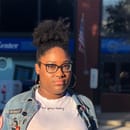Recently, the discourse surrounding Black girls with social anxiety has become increasingly popular due to a certain R&B singer and her supposed “inappropriate” behavior. Songstress Summer Walker has been under a lot of scrutiny lately due to her performances, interviews, and red carpet appearances. Walker has stated several times that she suffers from social anxiety, expressing that it may be the reason for her behavior but she has gone virtually unheard. The tormenting hasn’t stopped, every day on the internet, she is being called a new name and being criticized for something different. In fact, many do not even believe that she suffers from the illness.
The reality is when Black girls are suffering from any type of anxiety we aren’t afforded any understanding from our peers, family members, or people outside of our communities. We’re not anxious or scared instead, we’re “weird”, ill-mannered badly behaved, or just bitches. This isn’t speculation either, this was my lived experience for quite some time. I was first diagnosed with social anxiety disorder at 16 years old but, it didn’t take long for my parents or my therapist to come to the conclusion that I had been dealing with this for the majority of my life.
Throughout my childhood there were a number of adjectives used to describe me and my personality; mean, quiet, shy, rude, etc. I was known as the little girl with a perpetual attitude. My father had even started to affectionately refer to me as “Kiki Monster” giving tribute to the Sesame Street character and the permanent frown on my face. I was a lap child, who’d cry every time someone outside of my immediate family tried to hold me. On the first day of school, I had to be pried from my mother’s leg and dragged into the building.
For years my anxiety went untreated because no one knew the cause of my behavior, let alone how to treat it. Not even my mother, who is now a therapist that primarily works with Black and Brown children in the inner city of central Ohio. To this day, I am still dealing with the consequences of my untreated mental illnesses and have developed a few more to accompany the anxiety.
The stigma surrounding Black folks, specifically Black women does not only an intercommunal existence. We can’t recognize anxiety in our children and neither can the white doctors that treat us so, millions of other Black girls grow up like me. And I am one of the lucky ones, I am fortunate enough to have parents that realized the error in their ways and support me throughout my journey. It is important that we publicly embrace women like Summer Walker when they are brave enough to share these details about themselves, not alienate them. Becuase, this really isn’t about her at all. There are other young Black kids in the world that are going through the same thing that do not have the luxury of understanding parents or access to mental healthcare. We’re not only criticizing Summer but all the others like her, too.


